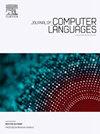一个用于自适应解析表达式语法的Haskell库
IF 1.8
3区 计算机科学
Q3 COMPUTER SCIENCE, SOFTWARE ENGINEERING
引用次数: 0
摘要
适应性解析表达式语法(APEG)是一种形式化模型,用于描述提供在解析过程中扩展其自身语法的机制的语言。在这项工作中,我们回顾了APEG的语法和语义,讨论了用于构建可扩展语言解析器的Haskell库的实现,并使用它来构建用于小型可扩展语言的APEG解析器。本文章由计算机程序翻译,如有差异,请以英文原文为准。
A Haskell Library for Adaptable Parsing Expression Grammars
Adaptable Parsing Expression Grammars (APEG) is a formal model for describing languages that provide a mechanism to extend their own syntax during the parsing process. In this work, we review the syntax and semantics of APEG, discuss the implementation of a Haskell library for building parsers for extensible languages and using it to construct an APEG parser for a tiny extensible language.
求助全文
通过发布文献求助,成功后即可免费获取论文全文。
去求助
来源期刊

Journal of Computer Languages
Computer Science-Computer Networks and Communications
CiteScore
5.00
自引率
13.60%
发文量
36
 求助内容:
求助内容: 应助结果提醒方式:
应助结果提醒方式:


